Tallinn (Parliament Politics Magazine) – Estonia offered to host British nuclear-capable F-35s, amid NATO consultations on rules of engagement following Russian incursions into alliance skies.
As reported by The Telegraph, Estonia’s defence minister Hanno Pevkur confirmed the country is open to hosting UK fighter jets with nuclear capability.
After a 12-minute Russian MiG-31 incursion into Estonia, NATO officials are reviewing rules of engagement. Some officials demand shooting down invading Russian aircraft, while others support a measured response.
What did Hanno Pevkur say about hosting UK nuclear jets?
When asked if Estonia is ready to host nuclear-capable British jets, Defence Minister Hanno Pevkur said,
“I’m always open. The door is always open for allies.”
He told local media that Estonia is willing to host allied aircraft, including those capable of carrying nuclear weapons, ahead of recent Russian airspace violations.
Mr Pevkur told reporters in Tallinn that NATO must respond to incidents “proportionately” and handle them on a “case-by-case basis.”
He added that the Russian MiG-31 jets were “not flying towards our capital” and carried no weapons, posing an “acute threat” to Estonia’s sovereignty or security.
The minister warned that in those situations, Estonia would not hesitate to engage Russian planes.
In a statement, he added,
“F-35 fighters have already been in Estonia, and they will again soon protect our airspace. If some of these aircraft, no matter which country they come from, have the ability to carry dual-purpose nuclear weapons, it does not change our position on welcoming the F-35. Of course, we are ready to host our allies.”
Russia claims its jets did not violate Estonian airspace, accusing the West of provoking tensions.
Responding to Russia’s statement, Mr Pevkur said Estonia has radar signals, images, and clear evidence of the airspace violation.
He added,
“We contacted them many times via radio frequencies that they are entering into our space, and they need to change the course. So they didn’t and, of course, this is unprecedented, [in that] we’ve not seen manned aircraft in Nato airspace for such a long time.”
Keir Starmer’s plan to deploy nuclear-capable F-35s
Earlier this year, British Prime Minister Sir Keir Starmer confirmed plans for the UK to purchase advanced F-35 jets, with deliveries expected before 2030.
The US manufactures the F-35A and controls the B61 nuclear bomb it carries, meaning Washington must approve any nuclear strike. Any move to deploy nuclear-capable jets near Russia would likely trigger a strong reaction from Moscow.
British F-35 fighters have regularly operated from Estonia’s Amari air base as part of NATO’s Baltic Air Policing mission, covering Latvia and Lithuania. The trio of Baltic states lacks its own fighter jet fleet.
The RAF has deployed Typhoon jets to Poland as part of NATO’s Eastern Sentry mission, responding to at least 20 recent Russian drone attacks.
The UK may choose against sending F-35As to Estonia when they are operational.
A British military insider explained that “there is no need to have a strategic capability forward in a tactical position in Estonia.”
They said the F-35As could escalate tensions rather than deter, and would face a high risk in a potential Russian first strike.
What were Petr Pavel and Donald Tusk’s positions on NATO airspace security?
Czech President Petr Pavel called for immediate shoot-downs, but Mr Pevkur described such measures as easier said than done.
He added,
“I would like to know what is the response of the Czech defence forces and their air force is when they have something in their air space.”
Polish Prime Minister Donald Tusk said Poland would take action against any aircraft violating its airspace, stating “there is absolutely no discussion” on the matter.
Poland’s stance was less clear in situations such as aircraft violations over its Baltic Sea oil platforms.
Yvette Cooper’s views on Russian incursions into NATO airspace
During first UN Security Council address as UK Foreign Secretary in New York, Yvette Cooper criticised Russian incursions into NATO airspace.
She said,
“They are a deliberate attempt to undermine the territorial integrity of sovereign nations and European security.”
Ms Cooper stated,
“They risk miscalculation. They open the door to direct armed confrontation between NATO and Russia.”
She warned,
“Your reckless actions risk direct armed confrontation between NATO and Russia. Our alliance is defensive, but be under no illusion, we stand ready to take all steps necessary to defend NATO’s skies and NATO’s territory.”
Ms Cooper added,
“We are vigilant. We are resolute. And if we need to confront planes that are operating in Nato airspace without permission, then we will do so.”
Vladimir Putin’s stance on extending the New Start nuclear treaty
Russia’s President Vladimir Putin said he would impose limits on the country’s nuclear arsenal if the US reciprocated.
Under those conditions, Mr Putin said he would agree to a one-year extension of the New Start treaty, which limits deployed warheads to 1,550 per side. He warned that without it both sides could violate the deal.
Key facts about the Russian incursions into NATO airspace
In September 2025, Russian jets and drones entered Estonia, Poland, and Romania. NATO launched Operation Eastern Sentry, invoked Article 4, and the UN condemned Russia.
Moscow denies the violations, claiming flights were over neutral waters. These incidents highlight ongoing tensions and the risk of escalation.

